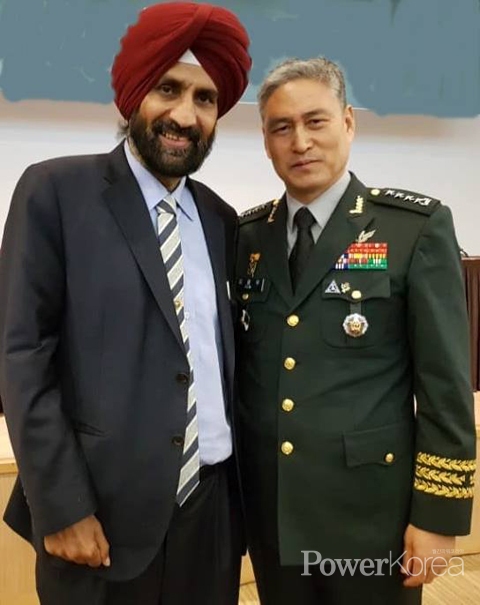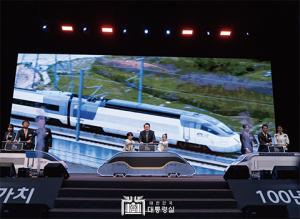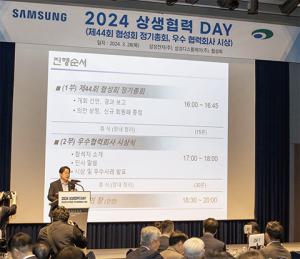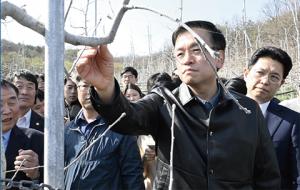 |
||
Dr. Lakhvinder Singh, known as the father of “India-Korea Strategic Partnership” has more than two decades of experience in working in Korea. He holds two doctorate degrees, one in Korean studies from Sungkyunwhan University in Seoul, Korea, and the other in International Politics from Jawaharlal Nehru University in Delhi, India. He also received a senior fellowship from Harvard University in the Practice of Trade Policy in the United States. Currently he is chairman of the India-Korea Business and Policy Forum. Author of more than 300 published papers and articles to his credit, Dr. Singh is a well-known figure in Korean academic, business and official circles. His recent book on South Korean strategic cooperation was published by Kyungnam University Press. Last year for his pioneering work he was awarded “honorary citizenship of Korea.” Recently during the Seoul Defense Dialogue 2019, Power Korea had the opportunity to sit with Dr. Singh in downtown Seoul. Here are some excerpts of the conversation.
1. Thanks for joining us today. How do you see the emerging security scenario in Northeast Asia?
It is my honor to talk to Korea’s most influential business and news magazine. In talking about security scenario, I say it is very fluid. Things are happening at very fast pace and no one can say for sure how and where the final situation will settle. The USA-Korea-Japan trilateral alliance which has kept peace in the region for more than seven decades isunder serious stress. Unprecedented expansion of the Chinese military is changing the balance of power in the region. Small powers like Korea are becoming more vulnerable and finding themselves unable to meet the situation alone. They are in dire need of partnering with other counties in the region facing the similar situation.
2 What are the challenges ahead in this fast-changing security scenario?
While the old security structure is being dismantled, a new security architecture is taking time. So, a vacuum is emerging where no one is in charge and every country is on its own. This could be very dangerous for the region’s peace and stability. As the region is full of past historical animosities and boundary disputes, a small spark of war could spread quickly and burn down the most prosperous region of the world. It is very important we create a new security institutional mechanism to sustain peace and prosperity before the current order fades away.
3 Can India help Korea in this situation?
India can help Korea in many ways to relieve the stress of the power shift. Currently Korea is heavily dependent on China economically. This is not good for the long-term interests of Korea. By offering Korean products an easy entry to Indian markets and special investment opportunities to Koreans who are moving away from China, India can reduce the economic pressure to a large extent.
The unprecedented Chinese military expansion, especially by its navy, is also putting security pressure on Korea. India can help by expanding its military cooperation with Korea.
4. What are the challenges in strengthening the partnership from the Indian side?
Although I have written extensively on this subject for the last two decades, Indian policy makers don’t fully understand the strategic importance of Korea for Indian security interests. They see no link between a strong, united Korea and Indian security interests. They do not fully understand Korea’s role in the regional “balance of power” and what will happen if it is forced to tilt towards China. Indian policy makers have gone for so far mostly empty and rhetoric engagement with Korea. Most of the agreements remain on paper only. Korea is very influential player in the region. I think final outcome of the ongoing security debate will be decided by Korea not China or Japan. India will regret one day if our officials don’t change their mind set towards Korea.
5. How do you see the recent visit of the Indian Defense Minster to Korea?
I see it very positively. A lot of ground was covered during his visit. He was the first Indian defense minister invited as a keynote speaker in Seoul Defense Dialogue 2019. Agreements and Memorandums of Understanding signed during his visit include the Implementation Agreement on Defense Educational Exchanges, the Implementation Arrangement on Mutual Logistics Support Agreement between the Indian Navy and ROK Navy, and Memorandums of Understanding between Hanwha Defense International and L&T and Society of Indian Defense Manufacturers (SIDM) and Korea Defense Industries Association (KDIA).
6. There is general criticism among participants of the Seoul Defense Dialogue that the Indian defense minister’s participation in the defense dialogue was not properly promoted . What do you think?
Very sorry to hear that. There may be some shortcomings felt by some participants. I really wish our officials paid more attention to minor details.
7. What could they have done differently?
Our defense minister should have had the opportunity to mingle with the Korean strategic community and listen to their suggestions and ideas. Hearing only the official version is not good. It is important that ground realties reach our policy makers unfiltered. Thus, to build a strong friendship with Koreans some handshaking, selfie- taking and free exchange of ideas was in order. A great opportunity to build trust and strengthen friendship with Korea’s strategic community was missed.
8. How do you see India-Korea defense industrial cooperation?
The Korean defense industry has reasonably good defense technologies and experience. If these companies invest in India with good technology transfers agreements, both sides could benefit from this engagement. It would boost India’s “Make in India” project. India-Korea defense industrial cooperation can definitely help India’s defense capabilities and help develop India’s defense industrial infrastructure.
9. Any cases of actual success on the ground of defense industrial cooperation?
We have seen some success in recent years. To begin with look at the case of the K9 Vajra 155mm/52. India’s private defense major Larsen & Toubro is jointly manufacturing this gun with Korea’s Hanwha Techwin. Under this deal, a total of 100 guns are to be produced. The net worth of this deal is estimated around US$1.3 billion. Another prime example of defense industrial cooperation is Hanwha’s K-30 Biho (Flying Tiger) twin 30mm short-range mobile self-propelled anti-aircraft system. The expected value of this deal, with quantities of 104 K-30 Biho systems, plus 97 ammunition carriers and 39 command vehicles, is said to be $2.6 billion. Last year, India and South Korea signed a bilateral agreementin defense shipbuilding.
There is also a talk of India offering Korea to build diesel submarines. Let us hope the Korean side takes this offer and some Indian submarines are built by a Korean company.
10. What are the challenges in way of India-Korea defense industry cooperation?
By its very nature defense industry cooperation takes time to materialize. Power is shifting so fast in the region that nobody can say for sure how the region will look like in mere five years. With China’s influence and grip tightening fast in the northeast, nobody can say for sure what the Korean government’s political position on defense cooperation with China’ rivals will be. In coming years, it might become very difficult and hard for Korean companies to keep sharing their sensitive high-tech weapon systems and critical technologies with India.
11. What are your suggestions to both governments to find a way out of this problem?
Today the Korea-India defense industry cooperation stands on sand top. It may slip from under us at any time. If Indian policymakers want to benefit from Korea’s defense know-how they simply cannot ignore the bigger picture. They must make sure politically and strategically Korea stays aligned with India and the ‘free world’ at large. There is no way Korea can continue investing in the development of the Indian defense industrial infrastructure when it not sustainable politically. These two things cannot go side by side. Thus, to benefit from Korean defense know-how, India must help Korea first.
12. Do you think Korea’s sovereignty and independence could be at stake if the Korean government fails to make appropriate strategic alignment in the fast-changing strategic environment? Could India be balancing force?
I think so. The USA–Korea-Japan trilateral security alliance which has been protecting Korea from external aggression has been getting weaker lately. Due to various pulls and pushes by the allies, Korea is being pushed into a corner. If this trend continues, Korea will have no choice but to say “no” to its current allies. There is a limit to which Korea can take unjust demands from its allies. However, given the unprecedented growth of the Chinese military it will be very difficult for Korea to face China on equal terms alone. Thus China might be tempted to pressure Korea to join the China camp on its terms. To build a powerful alliance between India and Korea, India must assure Koreans that it will be there in their hour of need. Only then will Koreans share their state-of-the-art defense technologies with India.
13. India’s close ties with Japan are continuously growing. Will it have any adverse effect on India- Korea defense ties?
No. Close cooperation with India Korea and Japan is very important for the security of the region. This was the main reason India took the lead in building the India-Korea-Japan trilateral security consultation mechanism. India, Korea and Japan are three major democracies in Asia. It is very important all of them remain on the same page. Emerging stronger ties between India and Japan will play major role in keeping the balance of power in the region and thus should be seen positively by Korea’s strategic community.
14. Do you think that Korea has lacked understanding about the balancing role of India in the region?
Most of Koreans still see India as a faraway country, good only for sightseeing or selling Korean products in the huge Indian market. And this underestimation of India’s role is the root cause of why India-Korea defense ties lack depth. Most of Korean officials just don’t feel the need to take that extra step. So problem is from both sides.
15. How could India bring Korea closer?
South Korea’s newly announced ‘Southern Policy’ which aims to develop strong ties with Southeast Asia and India is good sign for Indian strategic leadership. In return India can increase its engagement in Korean peninsula through its ‘Act East Policy”. Playing active role in Korean unification process and peace building on Korean peninsula by India can go a long way in brining india- and Korea closer together.
김종관 기자 powerkorea_j@naver.com







